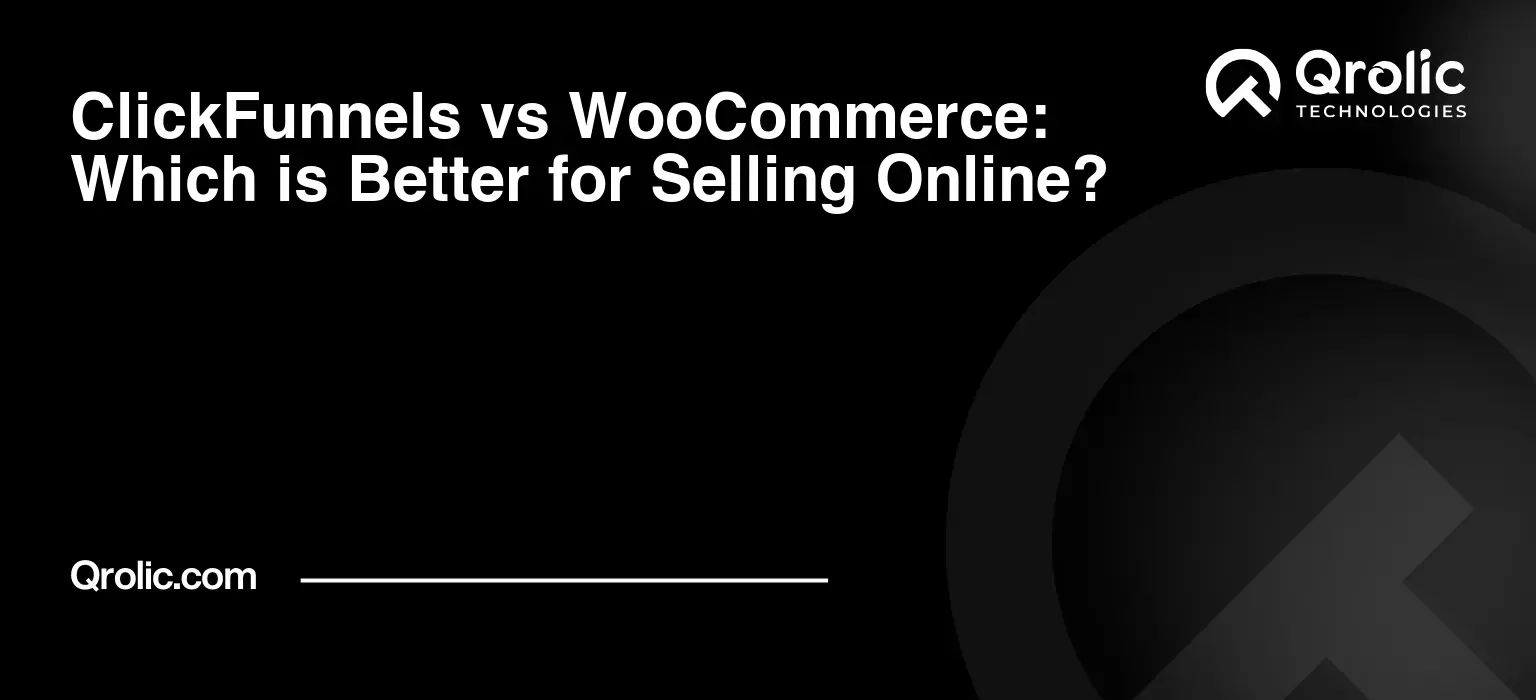Choosing the right platform for selling online can feel like navigating a jungle. You’re bombarded with options, each promising to be the “best” for your business. Two prominent contenders often emerge in this battle: ClickFunnels and WooCommerce. But which one truly reigns supreme for your unique needs? Let’s dive deep into the world of online sales platforms, dissecting ClickFunnels and WooCommerce to help you make the right decision.
Quick Summary:
- ClickFunnels is ideal for quick, simple sales funnels.
- WooCommerce offers full control for scalable online stores.
- Choose based on your budget, tech skills, and products.
Table of Contents
- Understanding the Core: What Are ClickFunnels and WooCommerce?
- ClickFunnels: The Sales Funnel Architect
- WooCommerce: The E-Commerce Customization King
- The Head-to-Head: ClickFunnels vs. WooCommerce
- 1. Ease of Use: Simplicity vs. Flexibility
- 2. Customization: Control vs. Constraints
- 3. Pricing: All-in-One vs. Incremental Costs
- 4. Integrations: Limited vs. Extensive
- 5. SEO: Focus on Funnels vs. Overall Website
- 6. Payment Gateways: Limited vs. Wide Variety
- 7. Scalability: Limits vs. Room to Grow
- 8. Support and Community: Dedicated vs. Community-Driven
- Real-World Scenarios: When to Choose ClickFunnels vs. WooCommerce
- Key Considerations Before Making a Decision
- Beyond the Basics: Advanced Features and Considerations
- The Future of E-Commerce: Trends to Watch
- Qrolic Technologies: Your Partner in E-Commerce Success
- Conclusion: The Verdict
Understanding the Core: What Are ClickFunnels and WooCommerce?
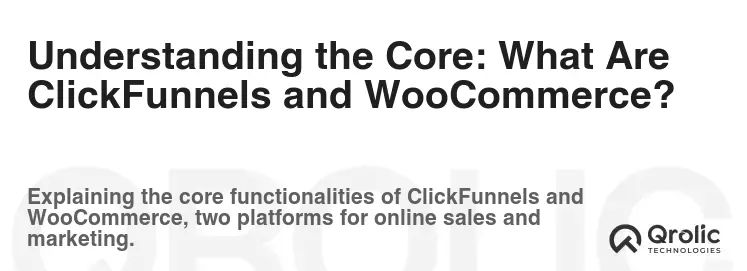
Before we pit them against each other, let’s clearly define what each platform offers.
ClickFunnels: The Sales Funnel Architect
ClickFunnels is an all-in-one sales funnel builder. Think of it as a guided path for your customers, leading them step-by-step towards a purchase. It’s designed specifically to:
- Capture Leads: Build landing pages to collect email addresses and contact information.
- Nurture Prospects: Automate email sequences to build relationships and educate potential customers.
- Sell Products & Services: Guide users through a streamlined checkout process, maximizing conversions.
- Manage Follow-Up: Automate follow-up emails and actions based on customer behavior.
ClickFunnels provides pre-built templates and a drag-and-drop interface, making it relatively easy for non-technical users to create effective sales funnels. The focus is on conversion rate optimization, turning visitors into paying customers.
WooCommerce: The E-Commerce Customization King
WooCommerce, on the other hand, is a powerful e-commerce plugin for WordPress. It transforms your existing WordPress website into a fully functional online store. Key features include:
- Product Listings: Easily add and manage products with detailed descriptions, images, and variations.
- Shopping Cart & Checkout: Provide a secure and intuitive shopping experience for customers.
- Payment Gateway Integration: Accept payments through various methods like PayPal, Stripe, and more.
- Inventory Management: Track stock levels and automatically update inventory.
- Shipping Options: Configure various shipping methods and calculate shipping costs.
WooCommerce is highly customizable and flexible. It offers a vast library of extensions and themes, allowing you to tailor your online store to your specific brand and needs. The focus is on scalability and control, giving you complete ownership over your e-commerce platform.
The Head-to-Head: ClickFunnels vs. WooCommerce
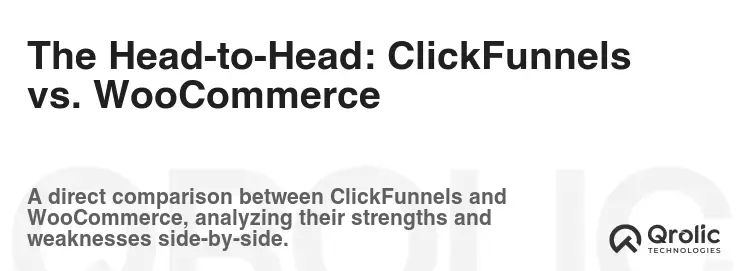
Now that we know what they are, let’s compare ClickFunnels and WooCommerce across various crucial aspects:
1. Ease of Use: Simplicity vs. Flexibility
- ClickFunnels: Wins in terms of pure simplicity. The drag-and-drop interface and pre-built templates make it incredibly easy to build sales funnels, even for beginners. You can create landing pages, order forms, and thank you pages in a matter of hours.
- WooCommerce: Has a steeper learning curve. While installing the plugin is straightforward, customizing your store and setting up advanced features requires more technical knowledge. You’ll likely need to spend time learning about WordPress themes, plugins, and potentially even some basic coding.
Winner: ClickFunnels for beginners and those who prioritize speed and simplicity.
2. Customization: Control vs. Constraints
- ClickFunnels: Offers limited customization. While you can adjust the appearance of your funnels, you’re largely restricted to the pre-designed templates and functionalities. This can be limiting if you have specific branding requirements or need advanced features.
- WooCommerce: Offers unparalleled customization. With thousands of WordPress themes and plugins available, you can tailor your store to your exact specifications. You have complete control over the look and feel of your store, as well as its functionality.
Winner: WooCommerce for businesses that require extensive customization and control over their online store.
3. Pricing: All-in-One vs. Incremental Costs
- ClickFunnels: Operates on a subscription-based model. The pricing plans can be expensive, especially for beginners. However, the plans include all the necessary tools for building and managing sales funnels. Their basic plan starts around $147/month.
- WooCommerce: Is a free plugin. However, you’ll need to pay for a domain name, hosting, a WordPress theme, and potentially premium plugins to enhance functionality. The overall cost can vary significantly depending on your chosen theme, plugins, and hosting plan. Initial costs are usually lower but can scale as your business grows.
Winner: WooCommerce can be more cost-effective in the long run, especially if you’re comfortable managing the technical aspects. ClickFunnels offers predictability but comes at a premium.
4. Integrations: Limited vs. Extensive
- ClickFunnels: Integrates with a limited number of third-party tools, primarily email marketing platforms and payment gateways. While it covers the essential integrations, the options are not as extensive as WooCommerce.
- WooCommerce: Boasts a vast library of integrations. You can connect your store with virtually any tool you need, from accounting software and CRM systems to social media platforms and marketing automation tools.
Winner: WooCommerce for businesses that require extensive integrations with various third-party tools.
5. SEO: Focus on Funnels vs. Overall Website
- ClickFunnels: Primarily focuses on optimizing individual funnel pages for conversion. While it offers some SEO features, it’s not designed for building a comprehensive SEO strategy for your entire website.
- WooCommerce: Benefits from WordPress’s robust SEO capabilities. You can use various SEO plugins to optimize your product pages, blog posts, and overall website structure for search engines.
Winner: WooCommerce for businesses that prioritize long-term SEO and organic traffic.
6. Payment Gateways: Limited vs. Wide Variety
- ClickFunnels: Integrates with a limited number of payment gateways, such as Stripe and PayPal.
- WooCommerce: Offers a wide variety of payment gateway integrations, allowing you to accept payments from customers around the world. You can choose from dozens of payment gateways, including popular options like Authorize.net, Square, and many more.
Winner: WooCommerce for businesses that need to offer a variety of payment options to their customers.
7. Scalability: Limits vs. Room to Grow
- ClickFunnels: Can become restrictive as your business grows. The limited customization options and integrations can hinder your ability to scale your operations. The need for custom integrations not readily available can require workarounds.
- WooCommerce: Is highly scalable. With the right hosting plan and optimized setup, you can handle a large volume of traffic and transactions. You can also add new features and functionalities as your business grows.
Winner: WooCommerce for businesses with ambitious growth plans and the need for a highly scalable platform.
8. Support and Community: Dedicated vs. Community-Driven
- ClickFunnels: Provides dedicated support to its users. You can access help through email, chat, and a comprehensive knowledge base.
- WooCommerce: Relies on a community-driven support system. While there are extensive online resources and forums, you may need to rely on third-party developers or support services for complex issues.
Winner: ClickFunnels for those who prefer dedicated support. WooCommerce has a large community, but finding the right answer might require more research.
Real-World Scenarios: When to Choose ClickFunnels vs. WooCommerce
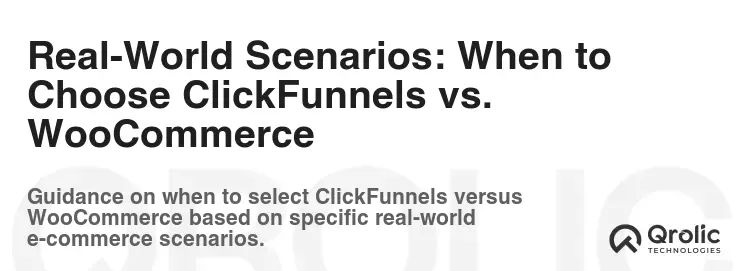
The best platform for you depends on your specific needs and goals. Here are some real-world scenarios to help you decide:
Choose ClickFunnels if:
- You’re selling a single product or a limited number of products: ClickFunnels is ideal for creating focused sales funnels for specific products or services.
- You want to launch quickly and easily: The drag-and-drop interface and pre-built templates allow you to create a sales funnel in a matter of hours.
- You don’t need extensive customization: If you’re happy with the pre-designed templates and functionalities, ClickFunnels can save you time and effort.
- You prioritize conversion rate optimization: ClickFunnels is designed to maximize conversions by guiding customers through a streamlined checkout process.
- You’re comfortable with a subscription-based model: The all-in-one pricing can be appealing if you don’t want to worry about managing multiple tools and plugins.
- You want built-in follow-up marketing: The platform’s email and automation features save time managing customer communication.
Choose WooCommerce if:
- You’re selling a wide range of products: WooCommerce is ideal for creating a fully functional online store with a large inventory.
- You need extensive customization: With thousands of themes and plugins available, you can tailor your store to your exact specifications.
- You want complete control over your online store: WooCommerce gives you full ownership and control over your data and platform.
- You prioritize SEO: WordPress’s robust SEO capabilities can help you attract more organic traffic to your store.
- You need to integrate with a variety of third-party tools: WooCommerce offers a vast library of integrations to connect your store with the tools you already use.
- You want a cost-effective solution: WooCommerce is a free plugin, and you can choose the themes and plugins that fit your budget.
- You’re comfortable with a steeper learning curve: Customizing your store and setting up advanced features requires more technical knowledge, but the flexibility is worth it for many businesses.
Key Considerations Before Making a Decision
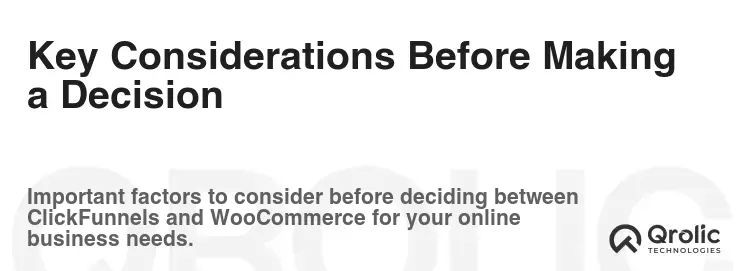
Before you jump into either platform, consider these critical factors:
- Your budget: Both platforms have different cost structures. Carefully evaluate your budget and choose the platform that fits your financial constraints.
- Your technical skills: WooCommerce requires more technical knowledge than ClickFunnels. If you’re not comfortable with WordPress or coding, ClickFunnels might be a better option.
- Your business goals: What are your long-term goals for your online store? Do you want to sell a limited number of products or build a large e-commerce empire?
- Your target audience: Who are you trying to reach? Consider their preferences and choose a platform that caters to their needs.
- Your time commitment: Building and managing an online store takes time and effort. Be realistic about your available time and choose a platform that you can manage effectively.
- Desired level of Automation: Both tools allow automation for parts of the sales process, but understanding how much you need and how each tool approaches it is important.
Beyond the Basics: Advanced Features and Considerations
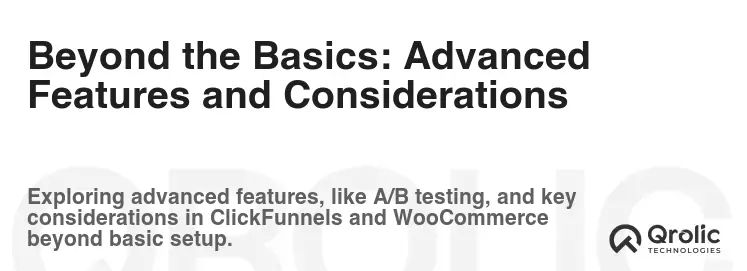
Let’s explore some advanced features and considerations that can further influence your decision:
- A/B Testing: Both platforms allow for A/B testing, but the implementation differs. ClickFunnels has built-in A/B testing features for funnel pages, while WooCommerce requires plugins for A/B testing product pages and other elements.
- Membership Sites: Both platforms can be used to create membership sites. ClickFunnels has a dedicated membership site feature, while WooCommerce requires a membership plugin.
- Affiliate Marketing: Both platforms support affiliate marketing. ClickFunnels has a built-in affiliate program management tool, while WooCommerce requires an affiliate plugin.
- Dropshipping: WooCommerce is often preferred for dropshipping due to its flexibility and integration with dropshipping plugins. ClickFunnels can be used for dropshipping, but it requires more creative workarounds.
- Digital Products vs. Physical Products: While both can handle both, WooCommerce might be more intuitive for managing physical inventory while ClickFunnels is great for digital information product promotion via funnels.
- Data Ownership: WooCommerce gives you complete ownership of your data, while ClickFunnels stores your data on their servers.
The Future of E-Commerce: Trends to Watch

The e-commerce landscape is constantly evolving. Here are some trends to watch that could influence your choice of platform:
- Artificial Intelligence (AI): AI is becoming increasingly prevalent in e-commerce, powering personalized recommendations, chatbots, and other advanced features.
- Mobile Commerce: Mobile devices are driving a growing share of online sales. Ensure your chosen platform is mobile-friendly and optimized for mobile commerce.
- Social Commerce: Selling directly through social media platforms is becoming increasingly popular. Consider platforms that integrate seamlessly with social media channels.
- Augmented Reality (AR): AR is transforming the shopping experience by allowing customers to virtually try on clothes, visualize furniture in their homes, and more.
- Sustainability: Consumers are increasingly concerned about sustainability. Consider platforms that allow you to showcase your commitment to sustainability.
- Personalized Experiences: The ability to deliver individualized experiences is becoming more critical, impacting design choices and data strategies.
Qrolic Technologies: Your Partner in E-Commerce Success

No matter which platform you choose, Qrolic Technologies (https://qrolic.com/) can help you achieve e-commerce success. We offer a range of services to help businesses of all sizes build and grow their online stores, including:
- E-commerce Website Development: We can build custom e-commerce websites on platforms like WooCommerce, Shopify, and more.
- E-commerce SEO: We can help you optimize your online store for search engines and attract more organic traffic.
- E-commerce Marketing: We can help you develop and implement effective marketing strategies to drive sales and grow your customer base.
- E-commerce Consulting: We can provide expert advice and guidance on all aspects of e-commerce, from platform selection to marketing strategy.
- Custom Plugin Development: Have unique needs for your WooCommerce store? We can build custom plugins.
- Theme Design and Customization: Ensure your brand stands out with a unique look and feel.
With our expertise and experience, we can help you navigate the complexities of e-commerce and achieve your business goals. We understand the nuances of both ClickFunnels and WooCommerce and can help you determine which platform best aligns with your specific business requirements and long-term vision.
Conclusion: The Verdict
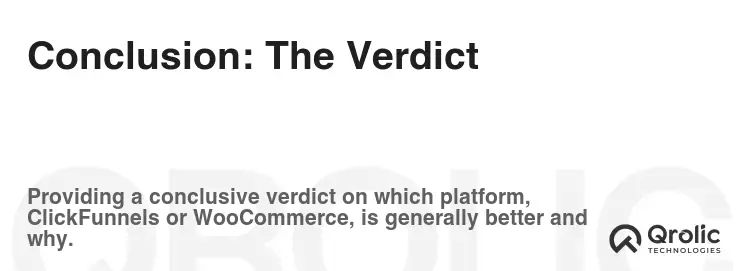
There is no single “better” platform. The choice between ClickFunnels and WooCommerce depends entirely on your individual needs, goals, and technical expertise.
- Choose ClickFunnels if: You need a simple, all-in-one solution for creating sales funnels and are willing to pay a premium for ease of use.
- Choose WooCommerce if: You need a highly customizable and scalable e-commerce platform and are comfortable with a steeper learning curve.
Carefully consider the factors discussed in this article and choose the platform that best aligns with your specific requirements. And remember, Qrolic Technologies (https://qrolic.com/) is here to help you every step of the way. Good luck building your online empire!
